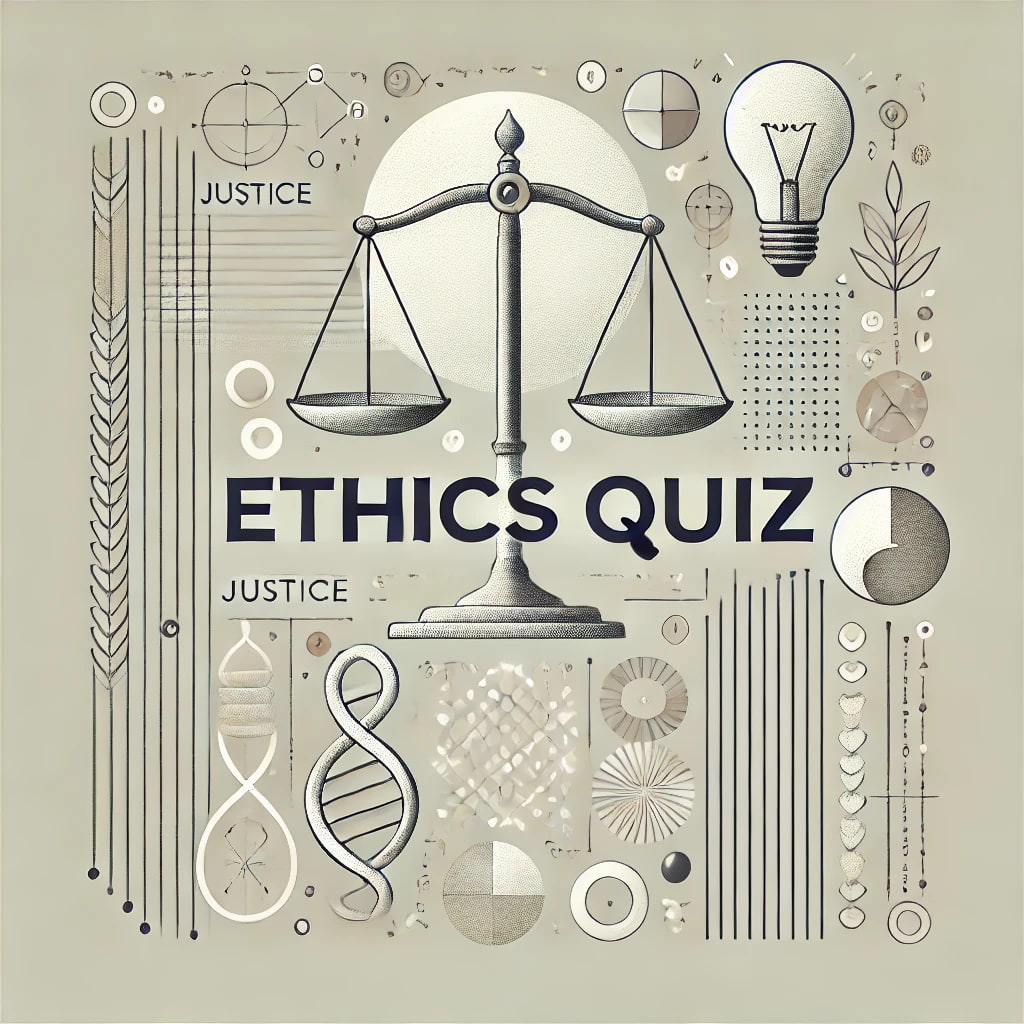Q1: Which ethical theory emphasises the greatest good for the greatest number?
A1: Utilitarianism
Q2: Select all of the following that are principles of deontological ethics.
A2: Duty-based actions, Moral absolutes
Q3: Arrange these ethical theories in the order they were historically developed, from earliest to latest.
A3: Virtue Ethics, Deontology, Utilitarianism
Q4: Select all of the following are ethical principles in business ethics.
A4: Integrity, Transparency, Fairness
Q5: What is the primary focus of virtue ethics?
A5: Development of moral character
Q6: According to Kantian ethics, what determines the morality of an action?
A6: The intention behind the action
Q7: Select all of the following are components of ethical relativism.
A7: Moral standards are culture-specific, Right and wrong are determined by societal norms
Q8: What is the term for the ethical principle that actions are right if they benefit the majority?
A8: Utilitarianism
Q9: Match each ethical theory to its primary focus.
A9: Deontology → Duty and rules, Utilitarianism → Consequences of actions, Virtue Ethics → Moral character
Q10: Which philosopher is associated with the concept of the categorical imperative?
A10: Immanuel Kant
Q11: What is the main focus of applied ethics?
A11: Practical application of ethical principles
Q12: Select all of the following are criticisms of utilitarianism.
A12: Ignores justice and individual rights, Difficult to calculate all consequences, Can justify immoral actions if they produce overall good
Q13: What is moral relativism?
A13: The idea that moral judgments are culturally based and subjective
Q14: Who is considered the father of modern utilitarianism?
A14: Jeremy Bentham
Q15: Select all of the following are characteristics of virtue ethics.
A15: Focus on moral character and virtues, Importance of developing good habits
Q16: What does the term "moral absolutism" refer to?
A16: The belief in unchanging moral principles
Q17: Which ethical theory is primarily concerned with the rights of individuals?
A17: Rights-based ethics
Q18: Select all of the following are types of ethical dilemmas.
A18: Conflict between moral duties, Situations requiring choice between two ethical principles, Ethical dilemmas in professional settings
Q19: What is the "veil of ignorance" in ethical theory?
A19: A method of determining fairness by imagining no knowledge of personal circumstances
Q20: What does "ethical egoism" advocate?
A20: Acting in one's own self-interest
Q21: Select all of the following are challenges in ethical decision-making.
A21: Conflicting moral principles, Lack of clear ethical guidelines, Pressure from stakeholders
Q22: What is the "golden rule" in ethics?
A22: Treat others as you would like to be treated.
Q23: What is "moral luck"?
A23: When the morality of an action depends on factors beyond the agent's control
Q24: Select all of the following are ethical theories.
A24: Utilitarianism, Deontology, Virtue Ethics
Q25: What is "ethical pluralism"?
A25: The acceptance of multiple ethical perspectives
Q26: What does "situational ethics" propose?
A26: Moral decisions should be based on the context of the situation
Q27: Select all of the following are key concepts in Kantian ethics.
A27: Categorical imperative, Duty-based ethics, Moral law
Q28: What is "ethical objectivism"?
A28: The belief that there are universal moral truths
Q29: Arrange these philosophers according to their contributions to ethical theory, from earliest to latest.
A29: Aristotle, Immanuel Kant, John Stuart Mill
Q30: What is the main idea behind "care ethics"?
A30: Importance of interpersonal relationships and care
Q31: What is the "trolley problem" used to illustrate in ethics?
A31: Moral dilemmas involving consequentialist and deontological ethics
Q32: Select all of the following are ethical issues in artificial intelligence.
A32: Bias in algorithmic decision-making, Privacy concerns with data usage, Accountability for autonomous systems
Q33: What is "moral nihilism"?
A33: The belief that no actions are morally right or wrong
Q34: Select all of the following are ethical frameworks used in decision-making.
A34: Utilitarian framework, Deontological framework, Virtue ethics framework
Q35: What is "moral absolutism"?
A35: The belief that there are absolute standards against which moral questions can be judged
Q36: What is the focus of "environmental ethics"?
A36: The moral relationship between humans and the environment
Q37: Select all of the following are ethical issues in business practices.
A37: Insider trading, Exploitative labour practices, Environmental pollution
Q38: What is "ethical subjectivism"?
A38: The belief that moral opinions are based on individual feelings and perspectives
Q39: Select all of the following are principles of justice as fairness by John Rawls.
A39: Equal basic liberties for all citizens, Social and economic inequalities arranged to benefit the least advantaged, Principles chosen behind a veil of ignorance
Q40: What is "bioethics"?
A40: The study of ethical issues in medicine and biology
Q41: What is "the is-ought problem" in ethics?
A41: The challenge of deriving prescriptive statements from descriptive statements

